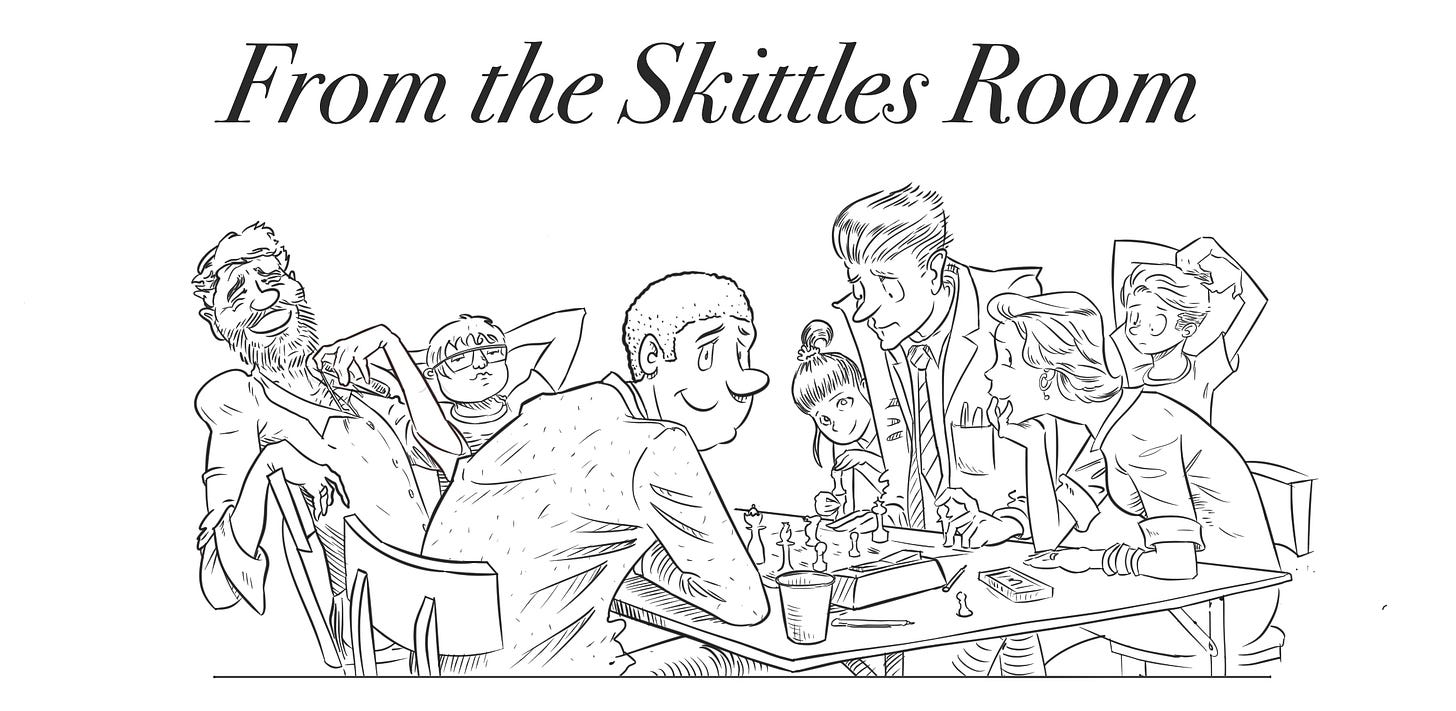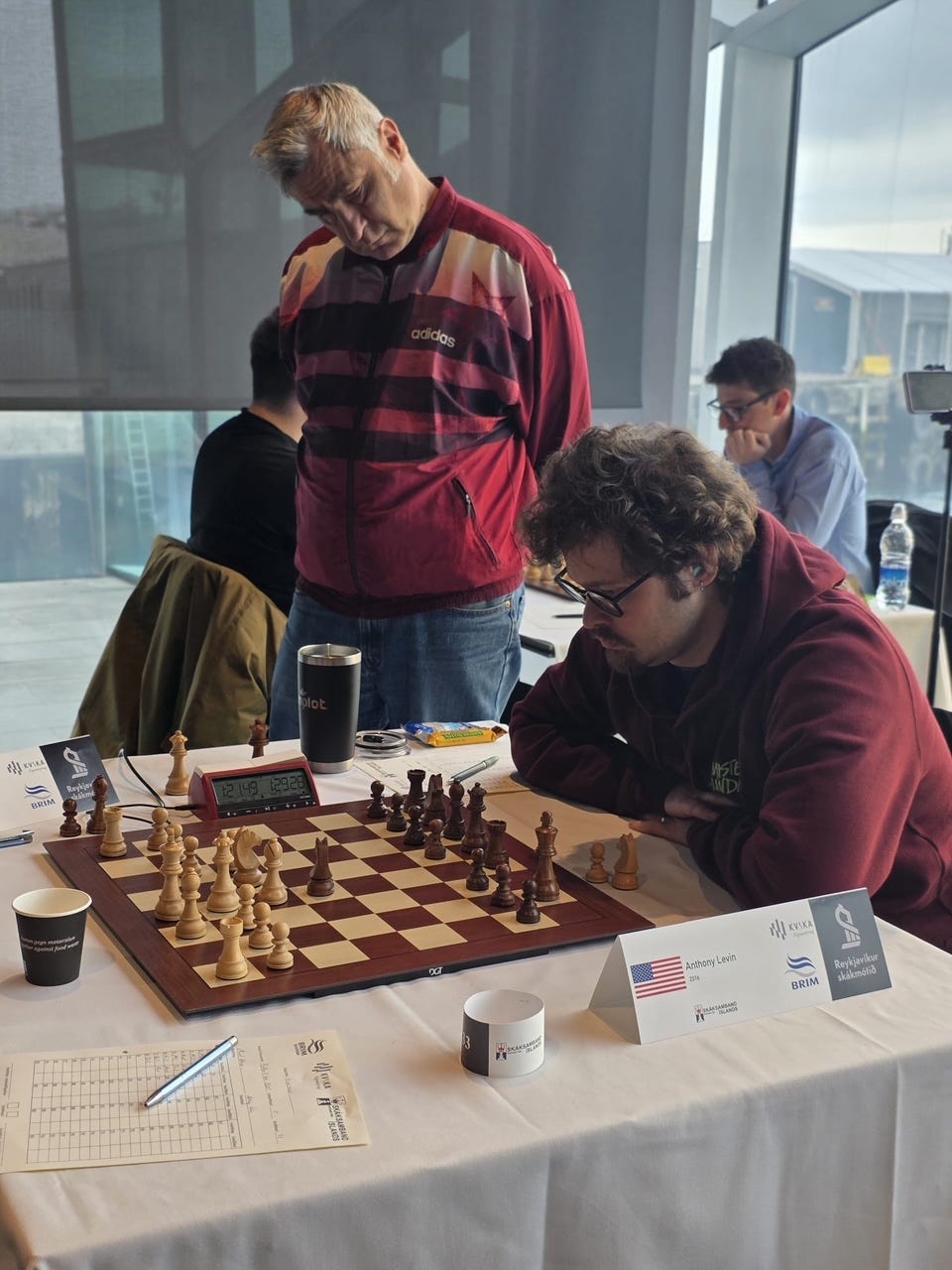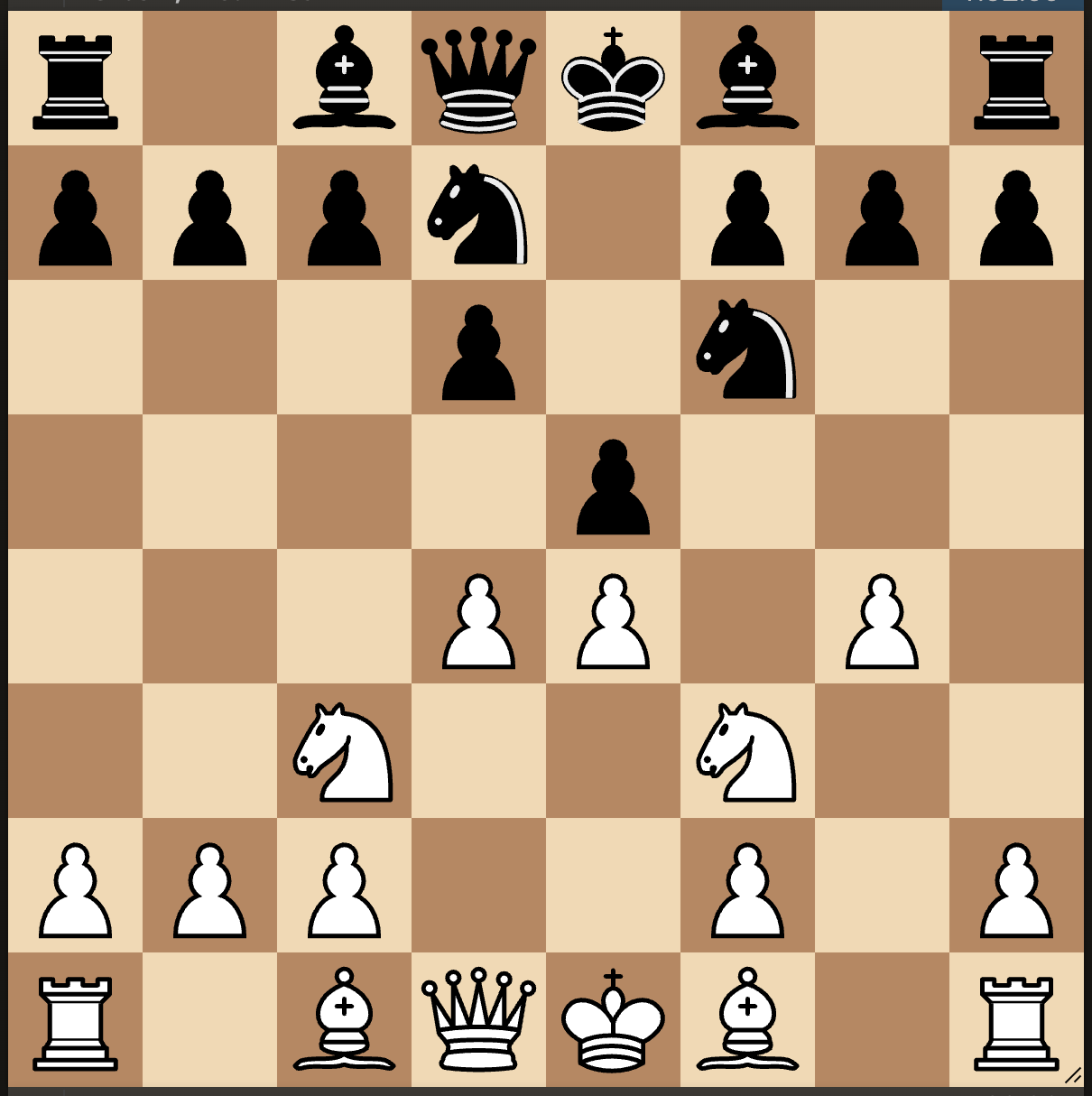In This Issue: Questions and Answers about the Sale of the Building, From the Board From The Skittles Room Games Analyzed, by GM Aleksandr Lenderman Chess Toons En Passant Problems, Problems, curated by Alexander George Editor's Note
To the Members and Parents of the Marshall Chess Club:
Thank you to those who provided constructive feedback regarding the possible sale of our building and purchase of another space. We would like to answer the most frequently asked questions and concerns that were raised in the feedback.
Question: Has a decision been made to sell our building and buy another building?
Answer: No. We are still in the process of exploring the options.
Question: Is there vacant space in the club building for expansion?
Answer: No. The three upper floors are all rented to residential tenants. Even if we could take over one of the apartments on the third floor, we would lose $5,000 in rent, money that would be very difficult to make up in tournament income.
Question: What are the main goals of a possible move?
Answer: Firstly, we want larger, more functional space. This will increase our tournament capacity and make playing conditions more comfortable, but it is NOT the main objective. We want dedicated classrooms, parents lounge, kitchen and event prep, skittles room, library for study and casual play, a museum area to house the club’s history, office space, proper bathrooms, streaming studio and adequate storage. Secondly, we want financial security that is independent of the popularity of the game. We want sale proceeds that will allow a space 3-4x larger than our current space AND allow us to create an endowment of several million dollars which will generate enough interest to provide a stable source of funding in perpetuity. It will allow us to expand our programs into the chess community and provide improved working benefits for our staff. We would be selling high-end residential space at around $3,000/foot and buying commercial space at around $600/foot.
Question: What about just renting extra space on the weekends?
Answer: That would not be cost-effective and would be logistically difficult and other than providing additional tournament space, it would not accomplish our main goals outlined in the previous answer.
Question: If the building is sold, would the Club be without a home for any period of time?
Answer: Absolutely not. We would require any sale contract to allow us to remain in the current building while we identify, purchase and build out a new space. We will always own our own space and control the destiny of the Club.
Question: Where might the new building be located?
Answer: We are considering locations in Chelsea or near Union Square, in nice neighborhoods near transportation and restaurants.
Question: What is the condition of the building?
Answer: We have made significant repairs and improvements to our 180 year-old building over the past few years, primarily to the roof, facade, windows and a new elevator. Much work needs to be done on outdated plumbing, steam lines, electric supply and general infrastructure. The building has tapped its full borrowing capacity and cannot afford any additional significant expenses. In addition, any major interior work would cause extended disruption to the Club’s operation.
Question: How is the Club doing financially?
Answer: The Club is in solid financial shape due to good management and strong interest in chess. If this interest wanes, we will have to raise fees, limit membership, cut staff, etc. to stay viable.
Question: Will any of the Board members benefit from the possible sale?
Answer: No. Every Board member is a volunteer, giving their time and ideas without compensation.
As a reminder, please provide any additional feedback by sending an email to buildingfeedback@marshallchessclub.org.
Thank you,
The Board of Governors
Welcome back, fellow chess players, to this edition of the Marshall Chess Club's fortnightly bulletin, The Marshall Spectator.
The editorial board of The Marshall Spectator would like to congratulate Marshall Chess Club member Elliot Goodrich, who crossed the 2200 threshold last weekend in the Morning Masters tournament to achieve the title of National Master.
This past week, several members, a board member, and even two former club champions traveled to Reykjavik, Iceland, to compete in what is quickly becoming one of the world’s most popular Open tournaments, The Reykjavik Open. Among those who played were former club champions IM Justin Sarkar, GM Brandon Jacobson, and even board member NM Anthony Levin - seen in the photo below contemplating his next move while legendary GM Ivanchuk pauses to consider his board. Kenneth Fernandez, Johnathan Subervi, Micah Jameson, Sam Sharf, George Rodnikov, and Joshua Colas also traveled to Iceland for the event.
Another exciting event on the horizon is the annual Chess in the Schools Poker event. Join Grandmaster Robert Hess and a lineup of poker and chess celebrities for an evening of great company, blitz chess, delicious food, and handcrafted cocktails—all in support of a fantastic cause.
This event benefits Chess in the Schools, a New York City-based nonprofit organization that empowers low-income youth through chess education, fostering both intellectual and social growth. Click here to purchase tickets.
Another exciting event on the horizon is the Marshall Book Sale!
Later this month, we are looking forward to another Author Talk and Book Signing with Vishnu Warrier.
Further ahead on the calendar, we are excited to share with you that summer registrations are open for our summer camps here. First things first- summer camp registrations are open here: https://www.marshallchessclub.org/tournaments/summer
Register before prices go up!
As you may or may not know, this is the first summer that the club is running the camps, so there are a lot of new changes to instructors, lunch, schedule, and other details. We are still finalizing details for additional dates in June.
Along with GM Djurabek Khamrakulov, we will be joined by a strong roster of GM and IM instructors and guests! See below for a confirmed list of instructors and guests. Please note that we are still in talks with other guests, including a five time classical World Champion!:
GM Djurabek Khamrakulov
GM Andrey Maksimenko
GM Alexander Shabalov
GM Oliver Barbosa
GM Andrew Tang
GM Brewington Hardaway
IM Mykola Bortnyk
IM Bogdan Vioreanu
IM Liam Putnam
GM Mark Paragua
Dates for July 2025
June 30th - July 3rd (4 Day) [GM Andrei Maksimenko]
July 7th - July 11th [GM Andrei Maksimenko]
July 14th - July 18th [GM Andrei Maksimenko]
July 21st - July 25th [GM Andrei Maksimenko]
July 28th - August 1st [GM Andrei Maksimenko]
For the month of July, we will be joined by GM Andrei Maksimenko of Ukraine. He graduated from Lviv University of Physical Culture, Chess Department, in 1993 and received a diploma as a chess coach and physical education teacher. In his 26 years of coaching, Andrei has worked with GMs Vasyl Ivanchuk (including work as a second at the World Championship in Las Vegas) Andrei Volokitin (first board of the Ukrainian national team). This summer, Andrei will bring the “soviet school of chess” to New York, and we look forward to welcoming him.
Looking back over the last two weeks, we have had a plethora of events for our members to play in.
The Morning Masters on April 12 had 8 players registered and was won by Daniel Smith, who scored 3 out of 3 to win $60, while CM Sukhiashvili Alexander and Paul Schepel scored 2 out of 3 to win $20 each.
The Under 2000 Morning Action on April 12 had 63 players registered and was won by 5 players who all got a perfect score. Sean Huang won a class prize of $233 for his perfect 3 out of 3, while Armaan C Jain, Dante Mayeno, Chris DeDona, and Dena Wang all won $135.75 for their 3 out of 3 score.
The Friday Blitz on Aprill 11 had 53 players registered and was won by FM Tanitoluwa Adewumi, who scored 8 out of 9 to win the $265 first place prize. GM Maxim Dlugy and FM Jeevan Karamsetty scored 7 out of 9 to win $99.38 each, while Jayden Feng and Armaan C Jain scored 6 points to win $66.25. The following 4 players all shared in a class prize, winning $16.56 each for their 6 out of 9 score: Santhosh Ayyappan, Aakaash Meduri, FM Linxi Zhu, and Luc Hoffman.
The Women and Girls’ Open on April 11 had 23 players registered and was won by Madison W, Summer Li, and Phoenix Robinson who scored 3 out of 3 to win $76.67 each.
The Afternoon Action on April 10 had 5 players registered and was won by Kenny Bollin who scored a perfect 3 out of 3 to win the $38 first place prize. Preston Li and Riju Bhattacharjee scored 2 out of 3 to win $12.50 each.
The Thursday Action on April 10 had 30 players registered and was won by Vladimir Bugayev who scored 4 out of 4 to win the $109 first place prize. IM Michael Song and FM Aditeya Das scored 3.5 out of 4 to win $64, while Joshua Block, Andrew Flores, Nathaniel Wyeth and John Mekus won $27.50 each for their performances.
The Rated Beginner Open on April 6 had 29 players registered and was won by Anthony Aquino, Jude Mahmoud, and Henry Fisher who scored 3 out of 3 to win $116.67 each.
The FIDE Premier Under 2000 that concluded on April 6 had 48 players registered and was won by Leqi Han who scored 4.5 out of 5 to win the $750 first place prize. Lucas Lu and Marco Ciacci scored 4 out of 5 to win $150 each, while Yunhui Ma scored 3.5 out of 5 to win a $225 place prize, while Adefolayimika Adekunle won a class prize of the same amount for their 3 out of 5 performance. Daryn Williams, Noah Lee-Mitchel, and Isaiah Cyprien scored 1.5 points each to win $62.50.
The FIDE Premier Open that concluded on April 6 had 40 players registered and was won by IM Nico Chasin who scored 4.5 out of 5 to win the $960 first place prize. Haari Muthukumar and IM Eshaan Hebbar scored 4 out of 5 to win $270 each, while Chase Knowles scored 3.5 out of 5 to win a $300 prize.
The Morning Masters on April 5 had 8 players registered and was won by Aditeya Das, who scored 2.5 out of 3 to win $53, while Aakaash Meduri and Elliot Goodright scored 2 out of 3 to win $17.50 each.
The Under 2000 Morning Action on April 5 had 56 players registered and was won by the following 6 players who scored 3 out of 3 to win $81.67 each: Alec Hyunmook Choi, Zack Aronov, Sascha Mayers, Manish S, Mingrui Ju, and Kenny T Bollin. There were no fewer than 10 players who scored 2 out of 3 to win $21 each: Aziz Abdijalilov, Oscar Finkin, Hugh William Verrier, Terrance Zeng, Charlotte Chang, Bruce Yaryshkin, Benjamin Abramowitz, Eli Sigman, Arthur Liu, and Ross Abramowitz.
The Afternoon Action on April 4 had 5 players registered and concluded with the following 3 players scoring 2 out of 3 to win $21 each: Shu Chen, James Souce, and John Bieda.
The Thursday Action on April 3 had 28 players registered and was won by Aditeya Das who won $119 for his perfect 4 out of 4 score. Bryan Weisz, Vladimir Bugayev, Joshua Block, and Anthony Levin scored 3 out of 4 to win $42.50 each, while Najee-Ana Walthrust scored 2.5 out of 4 to win a $51 class prize.
The Rated Beginner Open on March 30 had 34 players registered and was won by Isaac Carbajal and Adele Clifton, who scored a perfect 3 out of 3 to win $200 each.
The Sunday Quads on March 30 had 16 Quads of 4 registered and featured many prize winners. The following players won $50 each for winning their quad: Lucas Lu, Ishaan Rajendran, Sam Nemiroff, Charles Bernstein, Dervin Kouyate, Arjun Sarin Pradhan, Oliver Liu, Avery Goodrich, Grigory Razygraev, Milan Rajendran, Jameson Wong, Dawson Williams. The following players won $25 each: Jin Ma, Noah Gillston, Eli Stern, Leon Shevelenko, Jesse Lee, Warren Liang, Ethan Nazimowitz, and Jacob Modzelewski.
The Saturday Game 50 Under 1800 on March 29 had 40 players registered and was won by Viaan Suthar, who scored 4 out of 4 to win the $240 first place prize. Leo Fleischauer scored 3.5 out of 4 to win the $160 second place prize, while the following 4 players won $30 each for their 3 out of 4 score: Manish Suthar, Nate Wyeth, Cameron Baez, and Philip Xia.
The Under 2000 Morning Action on March 29 had 52 players registered and was won by Daguy Vaval, Aidan Amin, and Alexei Kumar who scored a perfect 3 out of 3 to win $151.67 each, while the following 9 players shared in a class prize, winning $21.67 each for their 2 out of 3 score: Emileo Martinez, Amiel Urilov, Jonathan Hsieh, Thyge Knuhtsen, Gavin Jiang, Abeer Sethi, Dave Vaval, Jacob Yang, and Arthur Liu.
The Morning Masters on March 29 had 4 players registered and was won by CM Sasha Schaefer who scored 3 out of 3 to win a $30 first place prize, while Alexander Fikiet scored 2 out of 3 to win the $20 second place prize.
The Saturday Game 50 Open on March 29 had 20 players and was won by Derek Zhang and Jude Kazan, who scored 3.5 out of 4 to win $100 each. Arhan Javeri also scored 3 out of 4 to win a $60 prize.
We look forward to seeing you at the club soon!
Games Analyzed, by GM Aleksandr Lenderman
The April edition of the Marshall Premier was won by IM Nico Chasin, who had a powerful 4.5/5 performance, or 4/4 with a half point bye round 4. He played several interesting games, starting with a nice king walk in round 1.
You can play through the games with analysis here.
Chasin, Nico - Creswell, Charlie
1. e4 c5 2. Nc3 Nc6 3. Nge2 e6 4. d4 cxd4 5. Nxd4 Qc7 6. Be3 a6 7. g4!? One of the trendy lines.
7... Bb4 (7... b5 Is the main line.) 8. Nxc6 Qxc6?! Inaccuracy. Bxc3+ was best. (8... Bxc3+) 9. Qd4 Bxc3+ 10. bxc3 Nf6 11. g5 (11. f3 Was also very strong and played by the legendary Topalov. 11... d6 12. O-O-O O-O 13. c4 Rd8 14. Qb6 Rd7 15. Be2 a5 16. Rd2 Ra6 17. Qxc6 Rxc6 18. Rhd1 h6 19. h4 Rdc7 20. c5 d5 21. g5 hxg5 22. hxg5 Nd7 23. exd5 exd5 24. Rxd5 Nf8 25. Bb5 Ne6 26. Bxc6 bxc6 27. Re5 Ba6 28. g6 Bc4 29. Rd8+ 1-0 (29) Topalov,V (2730)-Javakhishvili,L (2479) Salamanca 2021)
11... Nxe4 12. Qxg7 Rf8 13. Bg2 (13. O-O-O!?) 13... Qxc3+ 14. Qxc3 Nxc3 15. Kd2?! Inaccuracy. Bd4 was best. The start of the king walk. (15. Bd4 Was a bit stronger, and already played once in the database.) 15... Nb5 16. a4 Nd6 17. Bc5 Nc4+ 18. Kc3 d6 19. Kxc4 dxc5 20. Be4?! Inaccuracy. Kxc5 was best. (20. Kxc5) 20...h6 21. f4 Rb8 22. Kxc5 Ke7 23. Kb6 (23. a5!?) 23... Bd7 24. Ra3?! (24. gxh6 was a little bit stronger. 24... Rh8 25. Rhb1 Rxh6 26. Ka7) 24... Bc6 25. Bxc6 bxc6+ 26. Ka5 f6??
Strange decision to give up the h6 pawn. (26... hxg5 27. fxg5 f5!)
27. gxh6 Rh8 28. Rh3 Rbd8 29. Rg1 Rd5+ 30. Kb6 Rb8+? Mistake. f5 was best. (30... f5 31. h7 Kf7 32. c3 Rd2 33. Rh6 Rb2+ 34. Kc5 Ra2 35. Rd1 Kg7 36. Rh3)
31. Kc7 The completion of the king walk! 31... Rdd8?! (31... Ra8 32. h7 Rd7+ 33. Kb6 Rb8+ 34. Kc5 Rd5+ 35. Kc4 Kd6 36. h8=Q Rc5+ 37. Kd3)
32. Rg7+ Kf8 33. Rhg3 A good start for Nico! 1-0
Mottola, Max - Chasin, Nico
In the second round, Nico is playing with black against a strong master, Max Mottola, who was featured in the last Marshall Premier article in his interesting endgame against Liam Putnam.
1. e4 c5 2. Nf3 d6 3. d4 cxd4 4. Nxd4 Nf6 5. Nc3 a6 6. a4 g6 7. Be2 Bg7 8. O-O O-O 9. Be3 b6 (9... Nc6 Is the main line, and probably the objectively stronger move.)
10. a5 (10. Bf3!? e5 (10... Bb7 11. e5) 11. Nb3 Might've posed more problems for Black. 10... Bb7? Mistake. bxa5 was best.
The novelty wasn't the best in this position. (10... bxa5 11. Bf3 e5 12. Nb3 Nc6 13. Qd2 Rb8 14. Rfd1 Be6 15. Qxd6 Qxd6 16. Rxd6)
11. axb6 Nbd7 12. f3?! (12. Nb3! Was a strong idea for White, giving them some initiative. 12... Nxb6 (12... Nxe4 13. Nxe4 Bxe4 14. Ra4) 13. Na5)
12... Nxb6 13. Nb3 Qc7 14. Na5 Bc8 15. Qe1 Be6 16. Qf2 Rfb8 17. Bd4 Nbd7 18. b3 Rb4 19. Nc4 a5 20. Na4 d5 21. exd5 Nxd5 22. Bxg7 Kxg7 23. f4 This is likely an inaccuracy, giving up the e4 and g4 squares, and giving black some initiative. (23. Rfe1)
23... f6?! Inaccuracy. N5f6 was best. (23... N5f6) 24. Bd3 Bf7 25. Rae1 (25. Rac1) 25... Re8 26. Re4 Rbb8 27. Ne3 Nb4 28. Bc4 e6 29. Nd1 f5 30. Ree1 (30. Re2) 30... Nf6 31. Ndc3 31... Rbd8?! Inaccuracy. Ng4 was best. (31... Ng4! 32. Qe2 e5 33. Nb5 Qc6 34. Bxf7 Kxf7 35. Qc4+ Qxc4 36. bxc4 Nxc2 37. Nd6+)
32. Re2 e5 33. Nb5 (33. Bxf7) 33... Qb8 34. fxe5 Ng4 35. Qh4? Mistake. Qg3 was best. (35. Qg3 Bxc4 36. bxc4 Rxe5)
35... Bxc4?! Inaccuracy. Rxe5 was best. (35... Rxe5 36. Rxe5 Qxe5 37. Re1 Qf4 38. Nc5 g5 39. Bxf7 gxh4 40. Ne6+ Kxf7 41. Nxf4)
36. bxc4 Rxe5 37. Rxe5 Qxe5 38. Re1 Qf6 39. Qxf6+ Kxf6 Black has a clear advantage in the endgame and was able to convert very cleanly from there.
40. h3 Ne5 41. Na3 Rd2 42. Rc1 Re2 43. Nc3 Rd2 44. c5 Nd5 45. Rd1??
Blunder. Ncb1 was best. (45. Ncb1 Rd4 46. Re1 Nf4 47. Nc3 Rd2 48. Kf1 g5 49. Re4 Nd5 50. Re2 Rxe2)
45... Rxd1+ 46. Nxd1 Ke6 47. c4 Nf4 48. Nc3 Kd7 49. Nd5?! Inaccuracy. Na4 was best. (49. Na4 Kc6 50. Kf2 Ne6 51. Ke3 Nxc5 52. Nb2 Ne6 53. Na4 g5 54. Nb2 Kc5)
49... Ne6 50. Nf6+ Kc6 51. Nxh7 Kxc5 52. Nf6 Nxc4 53. Nc2 Nd4 54. Nd7+ Kd5 55. Nf6+ Ke5 56. Nd7+ Ke4 57. Nc5+ Kd5 58. Nxd4 Kxd4 59. Na4 Ne5 60. Kf2 Nd3+ 61. Kf3 g5 62. Nb6 Kc5 63. Na4+ Kb4 64. Nb6 Ne5+ 65. Kf2 a4 66. Nxa4?! Inaccuracy. Ke3 was best. (66. Ke3 a3 67. Kd4 Nc6+ 68. Kd5 a2 69. Kxc6 a1=Q 70. Kd5 Qg1 71. Ke5 Qxb6)
66... Kxa4 67. h4?! Inaccuracy. Ke3 was best. (67. Ke3 Ng6 68. Kd4 Kb3 69. Kd3 Nh4 70. Kd4 f4 71. Ke5 Nxg2 72. Ke4 Kc3)
67... gxh4 68. Ke3 Ng6 69. Kf3 Kb4 A very nice endgame technique by Nico. 0-1
Chasin, Nico - Muthukumar, Haa
1. d4 e6 2. Nf3 Nf6 3. c4 a6!? This is meant to be a bit of an Anti-Catalan line. 4. g3 White plays a Catalan setup nonetheless. (4. Nc3 d5 5. cxd5 exd5 6. Bg5 Is more common, and in fact, yours truly had this position as Black against Nico in the last round of the Centennial Open at the Marshall last July, where Nico won a nice endgame.)
4... b5 5. b3 Bb7 6. Bg2 6... c5 7. d5!? A very typical idea, where White doesn't lose the pawn because of a follow-up trick.
7... exd5 8. Nh4 g6 (8... Qc7 Might be slightly more accurate.) 9. O-O Bg7 10. Bb2 O-O 11. cxd5 d6 12. e4 12... Nbd7 (12... a5!? Is interesting, to start the queenside counterplay in the Benoni structure, and also keeping options open to potentially consider Na6 in addition to Nbd7.)
13. Re1 Re8 14. Nd2 Qb6 15. Rb1 Rac8 16. h3 Qa7 17. Bf1 White is slowly but surely getting an upper hand. The onus is on black to create counterplay since white has more space advantage.
17…Re7 18. Ng2 Ne5 19. Ne3 h5 20. a4! h4 21. g4 Qb6 22. Ng2 Bh6?! Inaccuracy. Rce8 was best. (22... Rce8 23. Qc2) 23. Nf3 Nxf3+ 24. Qxf3 Nd7 25. Nxh4 Rce8 26. Ng2 Bg7 27. Bxg7 Kxg7 28. g5 f6?! Inaccuracy. Re5 was best. (28... Re5) 29. h4?
(29. Qg3 Is a bit more accurate. 29... Bc8 30. Nh4 fxg5 31. Qxg5 Nf8 32. axb5 axb5 33. Qg3 Kg8 34. Re3 Rg7)
29... Qa5? Mistake. fxg5 was best. Missing a chance. (29... fxg5 30. hxg5 Bc8)
30. axb5 axb5 31. Qg3 Ne5? Mistake. fxg5 was best. (31... fxg5 32. hxg5 Ne5 33. Ne3 Bc8 34. f4 Nf7 35. Bg2 Kg8 36. Nc2 Qd2 37. Qf2) 32. gxf6+ Kxf6 33. f4 Nf7?! Inaccuracy. Nd7 was best. (33... Nd7 34. Ne3 Kf7 35. h5 Rg8 36. h6 Qc3 37. Bh3 Rf8 38. Rbc1 Qxb3 39. h7) 34. h5
34... gxh5? Mistake. g5 was best. (34... g5 35. e5+ dxe5 36. fxg5+ Kg7 37. Ne3 Kh8 38. Bg2 e4 39. d6 Rd7 40. g6)
35. Nh4 Nh8 36. Nf5 Rh7 37. Nxd6 Rg8?? (37... Ke7 38. Nxe8 Nf7 39. Ng7 Qb6 40. Qh4+ Kd7 41. Ne6 Rh8 42. Qg3 h4 43. Qe3) 38. e5+ A very nice and convincing positional victory by Nico against a very formidable opponent, putting him to a 3/3. 1-0
Hoffman, Luc - Chasin, Nico
In the last round, Luc Hoffman and Nico Chasin faced off at 3.5/4, the only players at 3.5/4 or higher. Luc is also a strong master who started 3/3, followed by a draw in round 4, while Nico had a half-point bye.
1. e4 d6!? A signal that Nico is going for a complex fight. 2. d4 Nf6 3. Nc3 e5 4. Nf3 Nbd7 5. g4!?
White plays one of the more principled lines, and is definitely not backing away from a fight.
5... Nxg4 6. Rg1 Ngf6 7. Be3 (7. Bc4 Is another main line in this position. 7... h6 8. Be3 Is probably the line that Luc Hoffman was aiming for and is the correct move order.)
7... g6 8. Bc4?! If White wanted to play this, he should've played it immediately. Possibly, white confused their lines. (8. Qd2 Is more accurate and more consistent with Be3. 8... Bg7 9. O-O-O exd4 10. Nxd4 O-O 11. Bh6 Nc5 12. Bxg7 Kxg7)
8... exd4?! (8... Bg7 Now, this is good for Black, since they didn't have to waste a tempo for h6. 9. dxe5 dxe5 10. Ng5 O-O)
9. Nxd4?! (9. Qxd4! Qe7 10. O-O-O Bg7 11. Bg5 Would be more challenging.)
9... Ne5 (9... Nb6!?) 10. Be2 Bg7 11. f4 Nc6 12. Qd2 O-O 13. O-O-O Bd7 14. h4 Re8 15. Bf3 Nxd4 16. Bxd4 Bc6?
This move is logical but it turns out that White has good tactical possibilities here. (16... c5! It was very important to play this move in order to activate the queen, and create immediate counterplay, while challenging the white bishop from their most active square. 17. Be3 (17. Bxf6 Qxf6) 17... Qa5 (17... Bc6))
17. h5!? (17. Rdf1!! Nxe4 18. Bxe4 Bxe4 19. Bxg7 Kxg7 20. f5 Was the strongest but quite difficult to find, especially when h5 was very tempting.)
17... Bxe4 18. Bxe4 Nxe4 19. Nxe4 Rxe4 20. Bxg7 Kxg7 21. Qc3+! Kf8 22. Qh8+?! White starts to lose the thread. (22. Rdf1! Again, this move is very strong, keeping the tension, and keeping all the ideas like f5, Qh8, and so on alive. Black would face a very difficult defensive task here. 22... Qe8!! 23. Qh8+ Ke7 24. Qxh7 Qg8 25. hxg6 Qxh7 26. gxh7 Rh8 27. Rh1 Black has to fight for a draw here.)
22... Ke7 23. Qc3?! (23. Qxh7 Qh8 24. hxg6 Qxh7 25. gxh7 Rh8 26. Rh1 Rxf4 27. Rde1+ Kf8 28. Re3 Rf6)
23... Kd7?! (23... Qe8!! Was the strongest according to the engine, but how many people would just give up a pawn on c7 like this with check 24. hxg6 hxg6 25. Qxc7+ Qd7 26. Qa5 (26. Qc3) 26... Qf5 27. Qc7+ Kf8 28. Rh1 Kg8 29. Qxb7 Rc8)
24. Qh3+ Re6 25. f5 gxf5 26. Qxf5 Qf8 27. Qb5+ Kc8 28. Qf5 b6 29. Qf3?! (29. Rdf1 Would still maintain equality after 29... Kb7 30. Qf3+ Ka6 31. Qa3+ Kb7)
29... Kd7 Now, Black consolidates. 30. Kb1?! (30. Qf5 Re8) 30... Rae8 31. Rdf1 f5 32. a4 (32. Qxf5 Qxf5 33. Rxf5 Re1+) 32... Re5 33. Qf4 R8e6 34. Qg5 f4 35. Qg4 Qf5 36. Qg7+? (36. Rxf4 Qxg4 37. Rfxg4 Rxh5 38. R1g2 h6 39. Rg8 Re8 40. R2g7+ Re7 41. Rg4 Re1+) 36... Re7 37. h6 f3 38. Qg3 Re2 Very nice game by Nico, playing very daring chess, but backing it up with good calculation, and scoring a clutch win. Nico showed very good balance in this tournament between great calculation, unpredictable openings, good positional play, and good endgame play. This tournament shows how strong Nico can be when he plays at his best, and hopefully he'll become a GM sooner rather than later. 0-1
GM Aleksandr Lenderman, Marshall Spectator Contributor
En Passant
Fridrik Olafsson, Grandmaster who led Iceland’s Rise in Chess, Dies at 90. At a time before his country became a chess powerhouse, he defeated four world champions, including Bobby Fischer and another in an unlikely turn of events.
The ancient game of chess is one steeped in tradition, with a history dating back centuries. It was once a game purely of endurance, a test of patience with titanic battles often taking days to find a winner. Much of that is true today, with the classical form of chess still prominent on the global stage. However, it’s no longer alone and perhaps in danger of taking a back seat. That’s because of the explosion of shorter forms of chess, which compile all those existing traditions into bitesize matches taking just a matter of minutes from start to finish.
In Game 8 of the FIDE Women’s World Championship Match, Tan Zhongyi changed her strategy, deviating from her usual English Opening in an attempt to shake things up and force a result. But despite the challenger’s fighting intentions, World Champion Ju Wenjun once again demonstrated why she now stands just half a point away from securing a fourth consecutive title.
Chess Toons
Problems, Problems, curated by Alexander George
Armand Lapierre, 1959
Mate in 2.
You'll need to do more than reason forward here - backward reasoning will also be needed. Here's a philosophical question for you: by doing something in the present, can you bring it about that something happened (or didn't) in the past? This problem will also require you to answer that!
---
Last issue’s puzzle: Hugo August, Otto Brennert, Thomas R. Dawson, Niels Høeg and Valerian Onitiu, 1924
Last move?
Solution: Kb4 x Na3.
---
Alexander George
Editor's Note
As always, if you have any feedback, comments, or would like to submit an article please contact us directly at td@marshallchessclub.org.
Enjoy, and thanks for reading!
The Marshall Chess Club
23 West Tenth Street New York, NY 10011
212.477.3716
Thanks for reading The Marshall Spectator! Subscribe for free to receive new posts and support the club.





















IF THE BOARD IS SERIOUS ABOUT SELLING 23 W 10
By way of introduction, for those who don't know me, I was the executive director of the Club from 2015 to 2021. During my tenure I worked intimately with the Board of Governors on many major initiatives. To name a few: the introduction of online tournament registration and pairings; the resumption of regular round-robin norm tournaments; two building renovations (including the conversion of a closet into a bathroom); and a major overhaul of the Club’s operating policies and procedures. I also launched and first edited The Spectator. I left the Club to become a lawyer.
I'm writing today in response to the Board’s March 30th letter. To be clear, I am not writing to take a position on whether or not the Board ought to sell 23 W 10 and purchase a new home for the Club. Rather, I write to urge that any such process be conducted with the necessary transparency, oversight, and strictures to prevent conflicts of interest.
It’s not an exaggeration to say that selling 23 W 10 would be the most consequential decision the Board has ever made—ever. And it cannot be a decision made on flimsy pretenses, in darkness, or without the input of Club members. If the Board is serious about selling the building, the following are non-negotiable preconditions.
(1) Full Transparency
The Board’s March 30th letter provides two stated reasons for potentially selling 23 W 10: (1) the Club is “at capacity”; and (2) the cost of maintaining the building is “substantial and continues to rise.” These may very well be legitimate reasons for moving. However, the members are entitled to definitive evidence illustrating how these two issues have become so unwieldy as to necessitate selling. The Members must know the extent of the Club’s “substantial” financial burdens and specific details of its capacity problem (How many players are turned away? How often? etc.).
The Members also have a right to know how the proposed new space will solve these problems with finality. The Board wrote that a new location would “enhance the chess experience” for members. But an “enhanced” chess experience is not responsive to the two stated reasons above: it’s a separate justification for moving. While some members may find a modern and more spacious venue to be an improvement, others may not. They may prefer the mystique of the Great Hall and the Club’s prime location between Washington and Union Squares.
It's not enough for the Board to point to vague “crossroads” and the theoretical benefits of moving to justify making this irreversible decision. The Club’s specific challenges need to be articulated with concrete data. A complete explanation of why other remedial measures will be insufficient to meet these challenges needs to be provided.
(2) Independent Oversight
Should the purchase and sale process move forward, it’s paramount that the Board ensure that the process is conducted with thorough diligence, accountability, and the transparency outlined above. The Board must commit to retaining a professional third-party trustee before any further steps are taken. There is far, far too much at stake in the sale of a West Village townhouse for the process to be overseen by anything less than objective professionals without skin in the game.
An independent trustee is vital at every step of the process. I was not surprised to hear (although anecdotally) that interested persons have caught wind of the March 30 letter and made overtures to the Board regarding their real estate connections. No member or Board member, however well intentioned, should gain a financial benefit from the sale of 23 W 10 or the purchase of a new property. Moreover, the proceeds of the sale would be a sum of money that demands careful and demonstrable oversight.
(3) Member Input
The members are, in fact, the owners of the Club. The Board exists as an expression of their will and the Board’s first, second, and third obligations are to be stewards of the Club for the members. It would be unconscionable for the Board to move forward with any purchase and sale without first hearing from the members.
Any proposed purchase and sale should require two referendums. First, a referendum at the next Annual Meeting asking members if the Board should explore selling 23 W 10 and purchasing a new home. The Board should only move forward if this referendum receives majority support. Then, if satisfactory purchase and sale bids are received, a second referendum should be held asking whether members assent to the specific terms in place. The purchase and sale should only proceed if that referendum is successful.
In the alternative—and at minimum—the Board should not take further steps towards a purchase and sale until after the next Annual Meeting. I don't imagine that any current Board member can claim to have been elected with a mandate to sell or not sell 23 W 10. This extremely important issue needs to be decided at the ballot box, so members can vote for candidates based on their stated views on this issue.
2025 and Beyond
I visited the Club earlier this month for the first time since 2022. The physical changes to the space—the new playing area downstairs, furniture in the backyard, and technological upgrades—were a real joy to see. I left with confidence that the Club is headed in the right direction. Let’s keep it that way.
Bryan Quick
Former MCC Executive Director